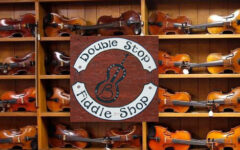 From October 1, 2010 through to the end of September 2011, we will, each day, celebrate the life of Bill Monroe by sharing information about him and those people who are associated with his life and music career. This information will include births and deaths; recording sessions; single, LP and CD release dates; and other interesting tidbits. Richard F. Thompson is responsible for the research and compilation of this information. We invite readers to share any tidbits, photos or memories you would like us to include.
From October 1, 2010 through to the end of September 2011, we will, each day, celebrate the life of Bill Monroe by sharing information about him and those people who are associated with his life and music career. This information will include births and deaths; recording sessions; single, LP and CD release dates; and other interesting tidbits. Richard F. Thompson is responsible for the research and compilation of this information. We invite readers to share any tidbits, photos or memories you would like us to include.
- September 7, 1968 Bill Monroe and the Blue Grass Boys made an appearance at the two-day Chautauque Bluegrass Festival, Chautauque Park, midway between Franklin and Miamisburg, Ohio.
- September 7, 1987 Paramount Pictures recording – Bill Monroe recorded Roanoke, and both instrumental and vocal versions of Blue Moon of Kentucky. Tom Ewing [guitar], Blake Williams [banjo], Mike Feagan [fiddle] and Tater Tate [bass] assisted during the session. The producer was Emory Gordy Jr. *
- September 7, 2004 L E White, fiddle player with the Blue Grass Boys in the early 1950s, died in Hendersonville, Tennessee. **
 * This afternoon session was for the film Planes, Trains and Automobiles and it took place in the Enterprise Recoding Studio, Burbank, California. The comedy film starring Steve Martin opened during the weekend of November 29, 1987, taking over $7,000,000 at the box office.
* This afternoon session was for the film Planes, Trains and Automobiles and it took place in the Enterprise Recoding Studio, Burbank, California. The comedy film starring Steve Martin opened during the weekend of November 29, 1987, taking over $7,000,000 at the box office.
Bill Monroe and actor John Candy tried to sing Blue Moon of Kentucky in unison, without much success, in the studio.
 ** L E White, aged 73, had been in failing health and had been confined to a wheelchair for some time. He had heart trouble as well as arthritis for many years.
** L E White, aged 73, had been in failing health and had been confined to a wheelchair for some time. He had heart trouble as well as arthritis for many years.
In 1977 he enjoyed some chart success for Epic Records with singing partner Lola Jean Dillon.
Prior to working with Monroe, White played with The Bailey Brothers and the Happy Valley Boys and also worked with the Osborne Brothers and Wilma Lee & Stoney Cooper for a time.
However, he is best known for his long association with country music singer Conway Twitty. He founded and managed Twitty’s music publishing companies, contributing about 200 of his own songs, including the Grammy award winning After The Fire Is Gone, recorded by Twitty with Loretta Lynn.
In 2002 White was recognized by the International Bluegrass Music Museum for belonging to the first generation of groundbreaking bluegrass musicians.







